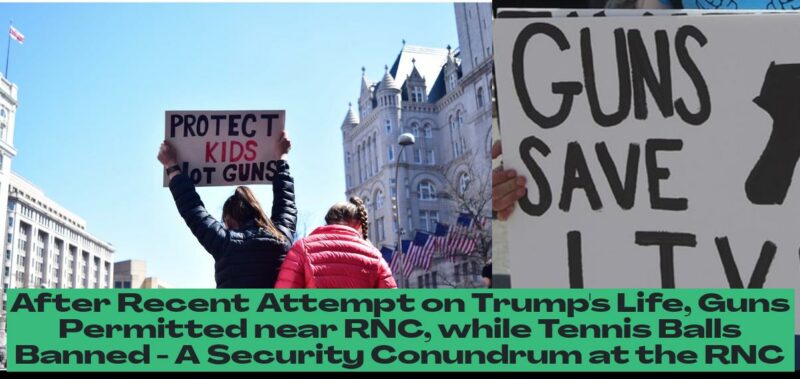The Controversial Issue of Guns at the RNC: A Tale of Two Policies
The Republican National Convention (RNC) is set to take place in Milwaukee, Wisconsin, amidst a heated political climate. This year, the event comes with a unique twist: the attempted assassination of former President Donald Trump just days before the convention. This incident has brought to light a significant security issue that has been a subject of debate for years: the presence of firearms at political events. The RNC is facing a tricky situation, caught between the right to bear arms and the need to ensure the safety of attendees.
The situation is further complicated by the fact that Wisconsin’s laws allow for open carry of firearms. This means that individuals can legally carry firearms in public, without any need for a permit or concealed carry license. The RNC is now faced with a difficult choice: to follow the law and allow guns in the outer perimeter of the convention, or to implement stricter security measures that might conflict with state law.
In the wake of the assassination attempt, the RNC has decided to ban all firearms from the convention center itself, as well as the immediate security perimeter surrounding it. However, they are legally obligated to follow state law and allow guns in the outer perimeter. This means that individuals can legally carry firearms within a certain distance of the convention center, even though they are prohibited from bringing them inside.
This decision has sparked fierce debate among the public and security professionals. Some argue that allowing guns in the outer perimeter creates a significant risk to the safety of attendees, especially in light of the recent assassination attempt. They believe that this policy could potentially lead to violence, as individuals with malicious intent could use the opportunity to access a restricted area.
On the other hand, supporters of the open-carry law argue that it is a fundamental right guaranteed by the Second Amendment and that restricting it would be a violation of constitutional rights. They believe that individuals should have the right to protect themselves and that restricting firearms would only make it more difficult for law-abiding citizens to defend themselves.
- Guns will still be allowed near the RNC, following Wisconsin’s open carry laws.
- Firearms are banned from the convention center and its immediate security perimeter.
- Tennis balls are prohibited from the RNC, unlike guns which are allowed in the outer perimeter.
- The decision to allow guns near the RNC has sparked debates on safety and constitutional rights.
- Supporters of open-carry laws argue for Second Amendment rights and self-defense.
- The RNC faces a challenging balance between security measures and constitutional rights.
A Balancing Act: Security vs. Rights
The RNC’s stance on guns at the convention is a prime example of the complex and often conflicting issues that arise when discussing gun control. It highlights the need for a delicate balance between individual rights and public safety. The RNC’s decision to ban guns inside the convention but allow them in the outer perimeter is a reflection of this delicate balancing act.
The issue of guns at political events is not new. In the past, there have been several instances of violence at political rallies, both in the United States and around the world. This has led to increased security measures at these events, including the use of metal detectors and bag checks. However, the presence of guns at these events remains a source of concern for many people.
The attempted assassination of Donald Trump has undoubtedly brought this issue to the forefront of the national conversation. The fact that the gunman was able to get so close to the former president, despite the presence of Secret Service agents, has raised serious questions about the effectiveness of security measures at political events. It has also highlighted the potential dangers of allowing firearms in close proximity to large crowds.
The RNC’s decision to ban guns inside the convention is a step in the right direction. However, the fact that guns will still be allowed in the outer perimeter raises concerns about the overall safety of the event. It seems ironic that the RNC is banning tennis balls, but not firearms, even after a shooting. This decision highlights the complex and often contradictory nature of gun laws in the United States.
Beyond the Firearms Debate: The Broader Picture
The RNC’s decision on guns is just one piece of a larger puzzle. The broader picture includes a range of issues concerning security at political events and the role of firearms in American society. The recent assassination attempt against Trump has ignited a national conversation on the need for enhanced security measures, not just at political events but across all public spaces. This includes reevaluating existing security protocols, implementing new technologies, and considering the role of mental health in preventing future acts of violence.
The situation also highlights the need to address the root causes of political polarization and violence. The increasingly divisive political climate in the United States is contributing to a sense of fear and anger, which can lead to extreme actions. Addressing these underlying issues is crucial to creating a more peaceful and secure society.
While the debate on gun control and security at political events is likely to continue, it is important to remember that the ultimate goal should be to create a safe and secure environment for all individuals. This requires a nuanced approach that takes into account both individual rights and public safety. It also requires a commitment to addressing the underlying causes of violence and creating a more peaceful and inclusive society.
A Call for Common Ground
In conclusion, the RNC’s decision to ban guns inside the convention while allowing them in the outer perimeter highlights the complex and often contradictory nature of gun laws in the United States. It is a stark reminder of the ongoing debate between individual rights and public safety. While the issue of guns at political events is likely to continue to be a source of controversy, it is important to find common ground and work towards a solution that ensures the safety of all individuals. The RNC’s decision is a step in the right direction, but it is only a first step. We need a comprehensive approach that addresses the issue of gun control, security at political events, and the broader issue of political polarization. Only then can we create a more peaceful and secure society for all.









